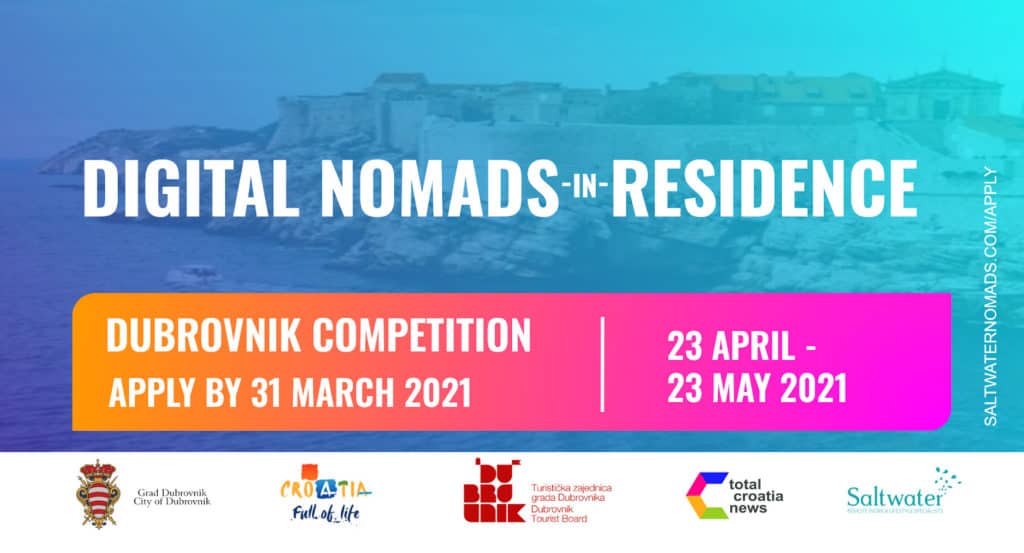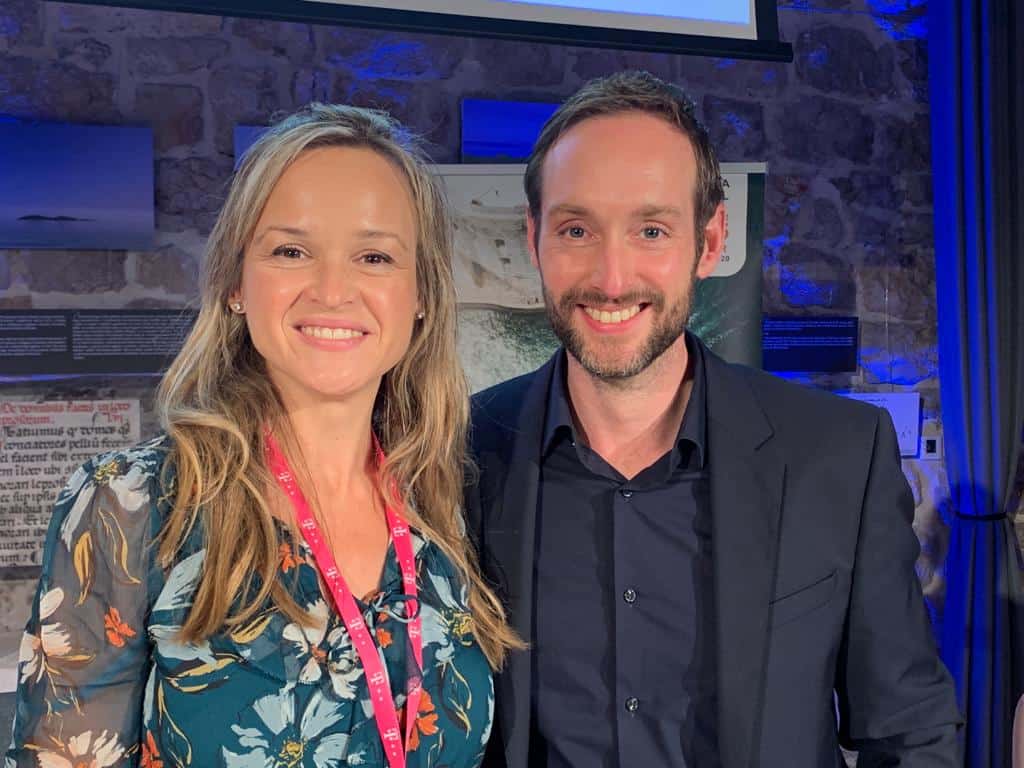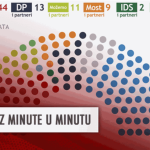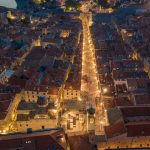There will be a billion digital nomads by 2035. Guide to why Croatia is a great digital nomad destination: lifestyle, community, services & co-working guide.
- What is a digital nomad?
- Why Croatia is a great digital nomad destination
- Destinations for digital nomads in Croatia
- What services are on offer?
- Top 5 co-working spaces
- The digital nomad community in Croatia
- When is the digital nomad season in Croatia?
- Croatia and the Schengen reset
- Bureaucracy for digital nomads in Croatia
- Finding accommodation
- A Dutchman asks a Prime Minister for a digital nomad visa
- From visa to permit, a law change for digital nomads
- Meet the first official digital nomad in Croatia, and the first on Hvar
- How to apply for the digital nomad permit in Croatia
- Croatia digital nomad permit application FAQs, the video
- Dubrovnik for Digital Nomads, Croatia’s first dedicated conference
- Dubrovnik Digital Nomads-in-Residence competition
- Saltwater Nomads, looking beyond the surface
The world is changing, and digitalisation is providing freedom for Internet-based businesses and individuals who want to be tied to their laptop and a good Internet connection wherever they are in the world, rather than a physical office.
Croatia is in an excellent position to take advantage of this opportunity. Here we look at what Croatia can offer digital nomads. I am very grateful to Tanja J. Polegubic, one of the co-working space pioneers of Croatia with Saltwater Split, pictured above, for her considerable input in this article.
What is a digital nomad?
Someone who can conduct their work on any device, any time, anywhere… and enjoy the benefits of travelling while making an income. No credit card debt waiting when you get home… if you ever go home!
You can be self-employed, a freelancer or employee.
Your company HQ or “National Tax Office” is not where you are working.
You usually are moving from place to place – from a few days to monthly stints. NB Digital Nomad is different from a remote worker.
Remote workers are based in one place – but not with the rest of the team. They either don’t live where HQ is, or move for a spouse, to care for a parent, form a new line of business, etc.
Why Croatia is a great digital nomad destination
Croatia has so many advantages and reasons why digital nomads should consider it as part of their lifestyle plan. These include:
- Great connectivity. Almost every cafe in the country has free WiFi, and 5G is already here. Not everything works perfectly in Croatia, but its fibre optics are excellent.
- English is widely spoken, as are German and Italian. It is said that more than 80% of the population speaks English.
- A strong tradition of tourism and hospitality – more than 18 million tourists visit every year.
- Lower cost of living than most of the EU.
- Fantastic climate, with more than 300 days of sunshine in parts of Dalmatia.
- Great connectivity to the rest of Europe by bus, plane, car and ferry. Split, for example, connects to more than 100 destinations by plane.
- A superb lifestyle. From leisurely 3-hour coffees on the riva to lazy days on the beach, there are few places in Europe which can offer the relaxed lifestyle of Croatia.
- One of the safest countries in Europe in terms of crime and security, and a wonderful place to bring up children.
- Fantastic local wines and healthy food, with UNESCO recognising the Croatian Mediterranean Diet.
Destinations for digital nomads in Croatia
Choosing a destination which is right for you is a very personal decision of course, and it reflects what particular personal needs you have. One of my favourite recent examples of a digital nomad making the switch to Croatia was Domagoj, who swapped the stress of the Toronto commute for a more sedate family lifestyle on the island of Korcula.
Dalmatian islands
Check out his story here, and if Korcula appeals, learn more in the Total Croatia Korcula in a Page guide. I can certainly vouch for the digital nomad island lifestyle, having lived it for several years on Croatia’s premier island – learn more in Hvar in a Page.
Split
Probably the best digital nomad destination in Croatia right now is the Dalmatian capital of Split. With its great climate, access to the islands and vibrant life, more expats are relocating to Split. Find out why in our Split in a Page guide.
Zagreb
The expat and digital nomad community are also expanding in the capital, Zagreb. The city has transformed itself in recent years, and it has become a very cool place to hang out, and not just in its famous Advent in Zagreb. Learn more in Zagreb in a Page.
Dubrovnik
Dubrovnik, Kings Landing, the Pearl of the Adriatic, whatever you want to call it, is Croatia’s most famous city. It is also a magnet for tourists and foreigners wanting to hang out, including digital nomads. Find out what’s on offer in Dubrovnik in a Page.
Istria
Further up the coast, the idyllic peninsula of Istria has long attracted visitors. Sometimes called the Croatian Tuscany, Istria is a foodie paradise, and its picture postcard hilltop walled villages are a joy to behold. The proximity to Slovenia and Italy makes is even more attractive. Learn a little more in 25 things to know about Istria.
Osijek
And if being on the coast is not essential, your budget is an issue, and you want to meet the friendliest people in Croatia in a beautiful city on the Danube, I heartily recommend Osijek in eastern Croatia – a wonderful city where prices are considerably lower but the welcome is the warmest in the region. Learn more in Osijek in a Page.
What services are on offer?
a) MUST HAVES: Fast internet, right vibe, great coffee, desk and comfortable chair.
b) NICE TO HAVE: Great location with enough dining variety and things to do.
c) AN INSTANT COMMUNITY. Especially for the solo digital nomad.
d) NETWORKING EVENTS – really key. Great way for digital nomads to get a read on the local scene, and for locals to get an international dose of … the outside world!
This is actually the most important part. It is the community-forming side, it promotes local engagement. Also the non tourist stuff – impromptu day trips and meals together.
e) Productive, distraction-free zone – rather than a cafe, where you have to drink a lot of coffee to justify the 4 seat table you’re taking up, unreliable wifi and people walking
past/talking during your video call. Not to mention the poor ergonomics 🙂 Fine for 1 hour, but if it’s an 8 hour day — think of your physical health, too!
f) Accommodation assistance – vital in an overpriced tourism market.
We know what’s not online…Eg. we have a lady who convinces her older friends to go to the island earlier, to make 1000 euro by offering up their central apartment for a month.
g) Staying/Staffing/Setting up Companies in Croatia. Tips, assistance and connections.
h) Advice. Where to eat, where to drink, meet people, find sports groups…. Get a watch repaired! People ask everything> We already tell them where to get the best coffee in town. The Aussies love a good flat white and the Americans love their Cold Brew!
Top 5 co-working spaces in Croatia
A useful Facebook page to follow is Coworking Croatia. Tanja gives her thoughts on the top 5 co-working spaces in Croatia, including her own Saltwater, of course – lots of people are raving about it, so I decided to leave it in:
- Saltwater. Clearly I am biased!
Female-founded, bootstrapped, local-engagement and events. Sea-view balcony overlooking Split Riva and harbour. Most central space with dedicated desk option (ie it is guaranteed yours rather than ‘hotdesking’ only). - WIP – Znjan Beach in Split. Owned and operated by Remote Year USA. Large groups. Event space. Friendly people.
- COIN – Zadar. EU funded space with a lot of locals and good buzz.
- Coworking Rovinj-Rovigno – First coworking space in Istra.
- Zagreb – So many to choose from. From women-led, to the Rent 24 chain.
The digital nomad community in Croatia
This is a tricky one. It’s not a ‘sticky’ bunch. They flow in and out. That’s why spaces serve as mooring points. Marinas for digital nomads. They know they’ll find what they need here.
Some return – most are just one-off visitors, having ticked Croatia off their list. Here is a snapshot:
Who is coming?
● Digital Nomads from USA*, UK, Australia and some parts of continental Europe – especially Germany. Some for 1-3 days in Split. Some for 1 month.
● Month-long paid programs. These usually have Split on the same itinerary as Lisbon and Barcelona, with a coworking space, accommodation and fitness option in price.
● Schengen-Resetters.
People who have outstayed 90 days somewhere and need to reset their stay.
● Most are single.
● Couples! On a pre-kid world trip, who need to be around other people as they travel, sleep and sometimes have to work side-by-side 24/7.
● Parents – if they have kids, it is generally a dad who needs to escape a home with young kids due to being sick/distracting/etc.
● Developers, software programmers, app developers, translators, web designers, copywriters, graphic designers, marketing agency owners, fitness centre owners, digital advertisers, grant-writers, corporate and IT people, development workers. ● Digital nomads from USA mention Trump as a big reason for leaving.
Other bonuses digital nomads bring:
They invite friends. Especially the returning nomads. They get the “nearly-local” status, as they’ve been here long enough. They promote the place to the tribe; other digital nomads.
How do digital nomads find co-working spaces?
● Google maps! We are a location-based business. If someone knows the value of a coworking space, they will seek out the one closest to the area they are living in.
● Other nomads, social media, Total Croatia News! 🙂
When is the digital nomad season in Croatia?
When are they coming?
The shoulder season seems popular (May-June then Sept-Oct), July-August has more short term stays, as in 1-3 days, as prices are expensive, so visits dwindle – it’s too expensive and people want to work less, swim more. October to December things pick up as it’s warmer than Northern Europe and still nice to explore the country.
January to March is pretty dead. Nomads are probably in Asia/Pac than wintry Europe – even if it is mild on the coast.
The mild coastal winter is something to promote more – especially to our Northern Europe digital nomads, including the Estonian e-citizens. I am discussing with a boutique hotelier winter month-long rates in an otherwise closed hotel. December is fantastic in Split/Zagreb.
How long do they stay?
1-3 days, 1 week to 1 month.
Croatia and the Schengen reset
Croatia is a member of the EU and NATO, but not yet in the Euro or Schengen zones. Both of the latter are in progress, with Croatia’s likely entry into the Schengen zone being 2020 or 2021. While it remains on the border of Schengen, Croatia is a handy place to use as a temporary base.
In every 6-month period, you can stay 90 days in Schengen zone. And it doesn’t have to be consecutive. So, for example, you can do 3 months in Switzerland (schengen) then 3 months in Croatia … or head “home” to the USA” for 2 months and do 1 month in Croatia. In 180 days the maximum number of days you can spend in the Schengen is 90 days, so people are choosing Croatia to reset the count.
Bureaucracy for digital nomads in Croatia
The visa requirements here are restrictive. Especially considering most of this group are non-EU and will spend daily and promote the location. Currently, they cannot stay more than 90 days. And leaving the country (especially if they have a business trip in Europe, hence their reason in choosing Croatia) proves problematic.
Anyone looking to stay needs to fill in those ~100 forms, have police visits, etc. And must register every time they return. Even so, where do you find this information? Online? In English? We match members to a friendly volunteer who has been through the process.
We help in other ways, such as getting a year-long rental agreement, fair priced, long-term accommodation and reputable legal advice.
It would be better if the decision makers realised the potential here – and made this process smooth – heck invite a few skilled nomads to build the system in exchange for residency, make it easy and position this country as a digital nomad destination.
But let’s get practical with some available Total Croatia information.
All you need to know about healthcare in Croatia.
Opening a bank account and a general overview of living in Croatia as a foreigner, as well as groups to meet people.
Finding accommodation
A word on accommodation in Croatia, which generally functions as elsewhere in the world. Booking.com and AirBnB are dominating the market, and there are no special things to know when booking accommodation in Croatia.
Apart from one – the tourist season.
If you are looking to move here full-time, then you will be able to negotiate a good rate in most places, but be aware that the Croatian economy is about 20% based on tourism, and many families see the tourist season as a means to supplement – or even be the main source of – income.
As the tourist season is still largely based on the peak summer months, finding a short-term rental for a month in August is going to be much more expensive than April for example. It pays to shop around, but if money is an issue and you want to enjoy Croatia when the sea is still warm, you are much more likely to get a good price from mid-May to mid-June and from September onwards.
This is less of an issue the further you move from the islands and Adriatic coast, and rents in continental Croatia – with the exception of Zagreb, tend to be much cheaper.
An overview of accommodation in Croatia.
A Dutchman asks a Prime Minister for a digital nomad visa
The digital nomad story took off in Croatia in 2020, when Dutch entrepreneur Jan de Jong – who has been living in Split since 2006 – wrote an open letter on LinkedIn to Prime Minister Andrej Plenkovic, asking that Croatia introduce a digital nomad visa.
For seasoned observers of Croatian bureaucracy, what happened next was nothing short of sensational. Just 44 days later, Plenkovic tweeted a photo of himself with de Jong, committing to the introduction of the visa. Legislation was attached to amendments to the Aliens Act the following day.
From visa to permit, a law change for digital nomads
Changes to the tax code were made, and the legislation was introduced for the regulation of the stay of digital nomads, effective January 1, 2021. This allowed for digital nomads who met the criteria to obtain a 12-month permit to stay, based on their status as digital nomads. These requirements were published by the Ministry of the Interior.
Meet the first official digital nomad in Croatia, and the first on Hvar
As the authorities worked on the online application process, we were all taken aback by the news that the first digital nomad visa had been approved in Istria, when an American applied for the visa at her local police station. Find out how Melissa Paul did it in her first interview on the process, with TCN – Meet Melissa Paul, Owner of Croatia’s First Digital Nomad Visa.
Others soon followed, and I also interviewed the first official digital nomad on Hvar, Jessica Romana from San Francisco. Jess also appeared on national television with partner Thibaud on the digital nomad lifestyle in Jelsa in winter, starting from California. You can see the video in this interview with Jess.
How to apply for the digital nomad permit in Croatia
On March 1, 2021, the official online application process went live on the website of the Ministry of the Interior. You can apply here.
Croatia digital nomad permit application FAQs, the video
Tanja (who else…) published this great FAQ video on the early questions arising from the first potential applicants, together with Nick Hathaway from 45 Degrees Sailing. Great production, great info.
Dubrovnik for Digital Nomads, Croatia’s first dedicated conference
Tanja (who else…) organised the first-ever digital nomad conference in Croatia in October, 2020, in partnership with the City of Dubrovnik, Dubrovnik Tourist Board and Total Croatia News.
Dubrovnik for Digital Nomads was a hug success, with coverage getting as far as a mention in The Washington Post. Here are my reflections on that inaugural conference.
Dubrovnik Digital Nomads-in-Residence competition

Tanja (who else…) also organised the world’s first Digital Nomads-in-Residence competition in Dubrovnik with the same partners in April 2021, an attempt to bring 10 international nomads to Dubrovnik to work with the city to develop its digital nomad strategy. Learn more about DN-i-R here.

Saltwater Nomads, looking beyond the surface
The digital nomad hysteria has arrived, and people are now looking at this new type of tourism as the next source of revenue. There needs to be a LOT of education for local tourism providers on the needs of nomads. Currently, many seem to thing that a clean apartment and good WiFi is all that is required to be advertised as ‘digitalnomad-friendly.’ It helps of course, but there is so much more than that.
Tanja (who else…) has written some great stuff on TCN for us. Sample articles include How Can Hotels Truly Serve Digital Nomads in Croatia? and 10 Ways Croatia Will Be At The Forefront of Countries with a Digital Nomad Visa (DNV). You can follow Tanja’s musings on TCN here.
For the latest on the digital nomad scene in Croatia, follow the dedicated TCN section.









